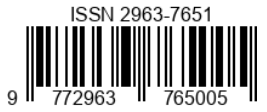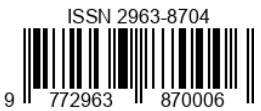Integrated Criminal Policy: Pelaksanaan Pidana Mati Pada Tindak Pidana Korupsi Pasca Kepres Nomor 12 Tahun 2020
DOI:
https://doi.org/10.55606/jhpis.v1i2.3412Keywords:
Death Penalty, Crime, Corruption, Covid-19Abstract
The criminal acts of corruption that occurred against funds for dealing with the Covid-19 pandemic raise the question of whether the death penalty can be applied to perpetrators of criminal acts of corruption. The aim of this research is to see the potential for applying the death penalty in cases of criminal acts of corruption with integrated criminal policy after the issuance of Presidential Decree of the Republic of Indonesia Number 12 of 2020 concerning the Determination of Non-Natural Disasters for the Spread of Corona Virus Disease 2019 (Covid-19) As a National Disaster. This research is normative legal research based on data collection, namely literature study and using a legal approach and theoretical approach in studying the issues in this research. The death penalty cannot be implemented or threatened against perpetrators of criminal acts of corruption regarding funds for dealing with the Covid-19 based on Presidential Decree 12/2020 considering the differences in the phrases "natural disasters", "social disasters" and "non-natural disasters" in the Law Number 24 of 2007 concerning Disaster Management. So "non-natural disaster" cannot be interpreted as a specific situation as explained in Article 2 Paragraph 2 of the Corruption Eradication Law. The presidential decree above is the government's social policy in dealing with the Covid-19 pandemic but cannot be interpreted as part of criminal law policy and integrated criminal law policy.
Downloads
References
Adhari, A. (2019). AMBIGUITAS PENGATURAN KEADAAN BAHAYA DALAM SISTEM KETATANEGARAAN INDONESIA. Dialogia Iuridica: Jurnal Hukum Bisnis Dan Investasi, 11(1), 43–61. https://doi.org/10.28932/di.v11i1.1960
Ariyanti, V. (2019). KEBIJAKAN PENEGAKAN HUKUM DALAM SISTEM PERADILAN PIDANA INDONESIA. Jurnal Yuridis, 6(2), 33. https://doi.org/10.35586/jyur.v6i2.789
Basalama, F. A. (2017). EKSISTENSI ASAS LEGALITAS DALAM UNDANGUNDANG NOMOR 8 TAHUN 1981 TENTANG KITAB UNDANG-UNDANG HUKUM ACARA PIDANA. Lex Crimen, 5(5), 52–57.
Gunawan, K. Y. (2020). PEMBERANTASAN TINDAK PIDANA KORUPSI PASCA RATIFIKASI THE UNITED NATIONS CONVENTION AGAINST CORRUPTION (UNCAC) DAN PEMBAHARUAN HUKUM PIDANA INDONESIA. Res Nullius Law Journal, 2(1), 8–34. https://doi.org/10.34010/rnlj.v2i1.2758
HANANTA, D. (2018). PERTIMBANGAN KEADAAN-KEADAAN MERINGANKAN DAN MEMBERATKAN DALAM PENJATUHAN PIDANA / AGGRAVATING AND MITIGATING CIRCUMSTANCES CONSIDERATION ON SENTENCING. Jurnal Hukum Dan Peradilan, 7(1), 87. https://doi.org/10.25216/jhp.7.1.2018.87-108
Heltaji, H. (2022). Dilema Hak Asasi Manusia dan Hukum Mati Dalam Konstitusi Indonesia. Pamulang Law Review, 4(2), 157. https://doi.org/10.32493/palrev.v4i2.17747
Hiariej, E. O. S. (2014). Prinsip-prinsip Hukum Pidana. Cahaya Atma Pustaka.
Iswinarno, C. Y. A. A. H. (2022, April 18). Miris, Saat Pandemi Tahun 2020-2021 Ada 30 Kasus Korupsi Dana Covid-19, ICW: Paling Banyak Menyunat Dana Bansos. Suara.Com.
Jusafri, J. (2021). Intergrated Criminal Policy: Peran Kementerian Agama Dalam Pencegahan Tindak Pidana Korupsi. SASI, 27(3), 323. https://doi.org/10.47268/sasi.v27i3.506
Kumala Dewi, N. K. R. (2020). KEBERADAAN PIDANA MATI DALAM KITAB UNDANG-UNDANG HUKUM PIDANA (KUHP). Jurnal Komunikasi Hukum (JKH), 6(1), 104. https://doi.org/10.23887/jkh.v6i1.23444
Kusumanadi, K. A., & Layang, I. W. B. S. (2021). ANALISIS YURIDIS KETENTUAN PASAL TINDAK PIDANA UJARAN KEBENCIAN (STUDY KASUS I GEDE ARY ASTINA) . Jurnal Kertha Negara, 9(12), 1089–1100.
Lahadi, J. S. (2020). KEBIJAKAN HUKUM PIDANA DALAM PENANGGULANGAN KEJAHATAN PENELANTARAN ANAK . JURNAL PURNAMA BERAZAM , 2(1), 80–96.
Marzuki, P. M. (2005). Penelitian Hukum. Kencana.
Nansi, W. S., & Sudirman, A. (2022). Peningkatan Pemahaman dan Partsipasi Pencegahan Korupsi bagi Mahasiswa Manggarai di Kota Makassar. Jurnal Abdi Masyarakat Indonesia, 2(2), 417–426. https://doi.org/10.54082/jamsi.235
Nirmaya, D. N., Farabi, F. F., & Lumbantobing, I. A. (2020). PENGARUH KRISIS MONETER, NILAI TUKAR, DAN INFLASI TERHADAP PERTUMBUHAN EKONOMI INDONESIA. JURNAL PENDIDIKAN EKONOMI INDONESIA, 2(1), 129–141.
Simarmata, L. N. (2021). KORUPSI SEKARANG DAN YANG AKAN DATANG. Jurnal Ilmiah Hukum Dirgantara, 11(2), 93–94.
Suhendar, S., & Kartono, K. (2020). KERUGIAN KEUANGAN NEGARA TELAAH DALAM PERSPEKTIF HUKUM ADMINISTRASI NEGARA DAN HUKUM PIDANA. Jurnal Surya Kencana Satu : Dinamika Masalah Hukum Dan Keadilan, 11(2), 233. https://doi.org/10.32493/jdmhkdmhk.v11i2.8048
Syamsudin, M. (2007). Operasionalisasi Penelitian Hukum. Rajawali Press.
Virtyani, M. Z., Muljaningsih, S., & Asmara, K. (2021). Studi Peristiwa Penetapan COVID-19 Sebagai Pandemi Oleh World Health Organization Terhadap Saham Sektor Healthcare di Bursa Efek Indonesia. Jurnal SEKURITAS (Saham, Ekonomi, Keuangan Dan Investasi), 4(3), 240. https://doi.org/10.32493/skt.v4i3.10608
Yulianto, S., Apriyadi, R. K., Aprilyanto, A., Winugroho, T., Ponangsera, I. S., & Wilopo, W. (2021). Histori Bencana dan Penanggulangannya di Indonesia Ditinjau Dari Perspektif Keamanan Nasional. PENDIPA Journal of Science Education, 5(2), 180–187. https://doi.org/10.33369/pendipa.5.2.180-187
Downloads
Published
How to Cite
Issue
Section
License
Copyright (c) 2022 JURNAL HUKUM, POLITIK DAN ILMU SOSIAL

This work is licensed under a Creative Commons Attribution-NonCommercial-ShareAlike 4.0 International License.








